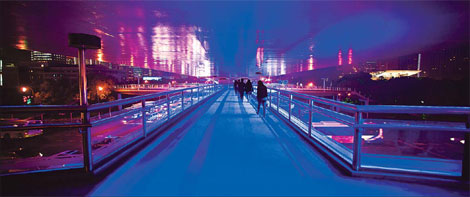Shanghai today
 |
|
Awash in a neon blue glow, even Shanghai's pedestrian overpasses symbolize modernity in the booming metropolis. Jonah M. Kessel / China Daily |
While this city's early 20th-century romance still excites the imagination of writers, contemporary life in the rapidly changing port town is also inspiring authors, Chitralekha Basu reports
Many writers, from Wang Anyi, a highly prolific chronicler of Shanghai's lightning-paced evolution, to the intense and powerful explorer of women's psyche, Hong Ying, and international heavyweights such as JG Ballard and Kazuo Ishiguro, are still fascinated by 1930s Shanghai.
Its inclusive, cosmopolitan ambience, its air of intrigue and cultural flowering, the juxtaposition of grand colonial architecture and the shadow of poverty and displacement looming in modest shikumen houses are apparently an enduring and unbeatable combination.
But there is also a new breed of writers living and working in the city who are chronicling modern life in Shanghai.
"There is a huge body of literature delineating contemporary Shanghai," says Zhao Lihong, vice-president of the 1,260 member-strong Shanghai Writers' Association. It's just that they lack the kind of visibility and demand from the market enjoyed by the books set in the past, he says. He receives a panoply of stories set in modern Shanghai every month for Shanghai Literature, a magazine of short stories and novellas, which he edits.
Zhao cites Wang Anyi's Song of Everlasting Sorrow (1995) and Wang Xiaoying's Song of a Long Street (2010) as two of the most thorough works on contemporary Shanghai. In the former, "although it's about four decades of Chinese history, beginning in 1945, the writer is reflecting on present-day Shanghai". Similarly, spanning 50 years of life on a Shanghai street, Wang Xiaoying's book is, "ultimately about the present".
Zhao himself has written several narrative poems (The City Through the Ages) and articles (In the Footsteps of Shanghai), tracing the city's eventful journey into the present. His current writings are personal, impressionistic views of Shanghai - its architecture, history, changing lifestyles and the deep and dynamic changes his own relationship with the city has been through.
Writing about Shanghai has been a perennial engagement for Wang Xiaoying. "But then Shanghai is like an ocean, to depict a complete picture is well nigh impossible," she says. "As one born, raised and living in Shanghai I feel a responsibility to depict the images of real Shanghai."














